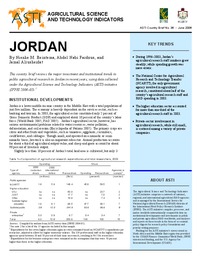Authors:
Beintema, Nienke; Fardous, Abdel Nabi; Alrusheidat, Jamal
Year:
2006
Publisher
International Food Policy Research Institute (IFPRI); and National Center for Agricultural Research and Technology Transfer (NCARTT)
Back to:
During 1996-2003, total agricultural research staff and expenditures in Jordan rose steadily. In 2003, the country spent close to $13 million (in 2000 prices) on agricultural R&D. Compared to many other countries in West Asia and North Africa, Jordan distinguishes itself in having a very high research intensity ratio—not uncommon for a country with a low AgGDP share, a small population and high per capita income.
NCARTT is the only government agency involved in agricultural research in Jordan. Consequently, it has a broad mandate, including conducting and coordinating research, adapting, and transferring technologies, and building the country’s agricultural research capacity. The higher education sector plays a significant role in agricultural research in Jordan. The oldest and most important of these agencies is the UoJ’s Faculty of Agriculture, where staff spend a substantial amount of their time on research (50 percent in 2003). Various private companies are also engaged in agricultural research—focusing primarily on fertilizer, fruit, and vegetable research—but the research capacity of each company is very small.
The number of researchers with doctorate degrees almost doubled between 1997 and 2003. This primarily stemmed from NCARTT’s focus on human resource development in its recently completed five-year workplan and the subsequent return of employees upon completion of their graduate studies. Despite this focus on capacity building, NCARTT’s effectiveness and growth has been hindered by low salary caps, which have created a disincentive in attracting and keeping well-qualified staff. Negotiations with the national government are currently ongoing to enable NCARTT to restructure its salary levels and thereby compete effectively for staff with the
higher education sector.

